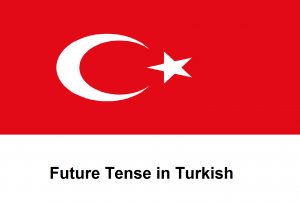Difference between revisions of "Language/Turkish/Grammar/Future-Tense"
(→Rules) |
|||
| Line 19: | Line 19: | ||
==Rules== | ==Rules== | ||
Turkish conjugation | The Turkish conjugation is very similar to other European languages. | ||
First | First, you need to take the root of the verb and add the future tense to the end. You can form the future tense in Turkish with the <code>-ecek</code> and <code>-acak</code> additions. | ||
For example, you should start with the verb "love" (sevmek). The | For example, you should start with the verb "to love" (sevmek). The verbal root is <code>sev-</code>. The future addition is, in the first singular, <code>-eceğim</code>. So it will be: <code>sev + eceğim</code>. | ||
"I will always love you (Seni daima seveceğim)". | "I will always love you (Seni daima seveceğim)". | ||
You don't need to use "I" (ben) at the | You don't need to use "I" (ben) at the beginning of the sentence because you already express "I" with the <code>-ecek</code> addition. Only if you want to emphasize, you can add the first pronoun "I" (ben). | ||
It works the same as | It works the same way as other European languages. For example, if you want to say "I love you" in Italian, you would say "ti amo". The verb is <code>amare</code> and the verb stem is <code>-am</code>. The first singular addition is <code>-o</code>. Namely the complete sentence is <code>amo</code>. It's the same in Turkish. | ||
Here is the formula to use: | |||
<code>PRONOUNS + VERB + (ECEK / ACAK)</code> | <code>PRONOUNS + VERB + (ECEK / ACAK)</code> | ||
==Conjugation== | ==Conjugation== | ||
{| class="wikitable" | {| class="wikitable" | ||
Revision as of 14:52, 16 May 2022
Merhaba everybody 😎
In today's lesson you will learn how to Express the Future Tense in Turkish.
There are many ways to express future in Turkish but generally, we use the terminations -ecek and -acak.
Happy learning! :)
Rules
The Turkish conjugation is very similar to other European languages.
First, you need to take the root of the verb and add the future tense to the end. You can form the future tense in Turkish with the -ecek and -acak additions.
For example, you should start with the verb "to love" (sevmek). The verbal root is sev-. The future addition is, in the first singular, -eceğim. So it will be: sev + eceğim.
"I will always love you (Seni daima seveceğim)".
You don't need to use "I" (ben) at the beginning of the sentence because you already express "I" with the -ecek addition. Only if you want to emphasize, you can add the first pronoun "I" (ben).
It works the same way as other European languages. For example, if you want to say "I love you" in Italian, you would say "ti amo". The verb is amare and the verb stem is -am. The first singular addition is -o. Namely the complete sentence is amo. It's the same in Turkish.
Here is the formula to use:
PRONOUNS + VERB + (ECEK / ACAK)
Conjugation
| PRONOUNS | PRONOUNS | ||
|---|---|---|---|
| ben | -eceğim | I | will |
| sen | -eceksin | you | will |
| o | -ecek | he/she/it | will |
| biz | -eceğiz | we | will |
| siz | -eceksiniz | you | will |
| onlar | -ecekler | they | will |
Examples
- Ben geleceğim: I will come
- Sen geleceksin: you will come
| ENGLISH | TURKISH | PRONUNCIATION ENGLISH |
|---|---|---|
| I WILL COME | BEN GELECEĞİM | behn geh leh jeh eh ihm |
| YOU WILL COME | SEN GELECEKSİN | sehn geh leh jehk sihn |
| HE / SHE / IT
WILL COME |
O GELECEK | oh geh leh jehk |
| WE WILL COME | BİZ GELECEĞİZ | bihz geh leh jeh eh ihz |
| YOU WILL COME | SİZ GELECEKSİNİZ | sihz geh leh jehk sih nihz |
| THEY
WILL COME |
ONLAR
GELECEKLER |
ohn lahr
geh leh jehk lehr |
| I WILL COME
HOME |
BEN EVE
GELECEĞİM |
behn eh veh
geh leh jeh eh ihm |
| YOU WILL COME
HOME |
SEN EVE
GELECEKSİN |
sehn eh veh
geh leh jehk sihn |
| HE WILL COME
HOME |
O EVE
GELECEK |
oh eh veh
geh leh jehk |
| WE WILL COME
HOME |
BİZ EVE
GELECEĞİZ |
bihz eh veh
geh leh jeh eh ihz |
| YOU WILL COME
HOME |
SİZ EVE
GELECEKSİNİZ |
sihz eh veh
geh leh jehk sih nihz |
| THEY WILL
COME HOME |
ONLAR EVE
GELECEKLER |
ohn lahr
eh veh geh leh jehk lehr |
